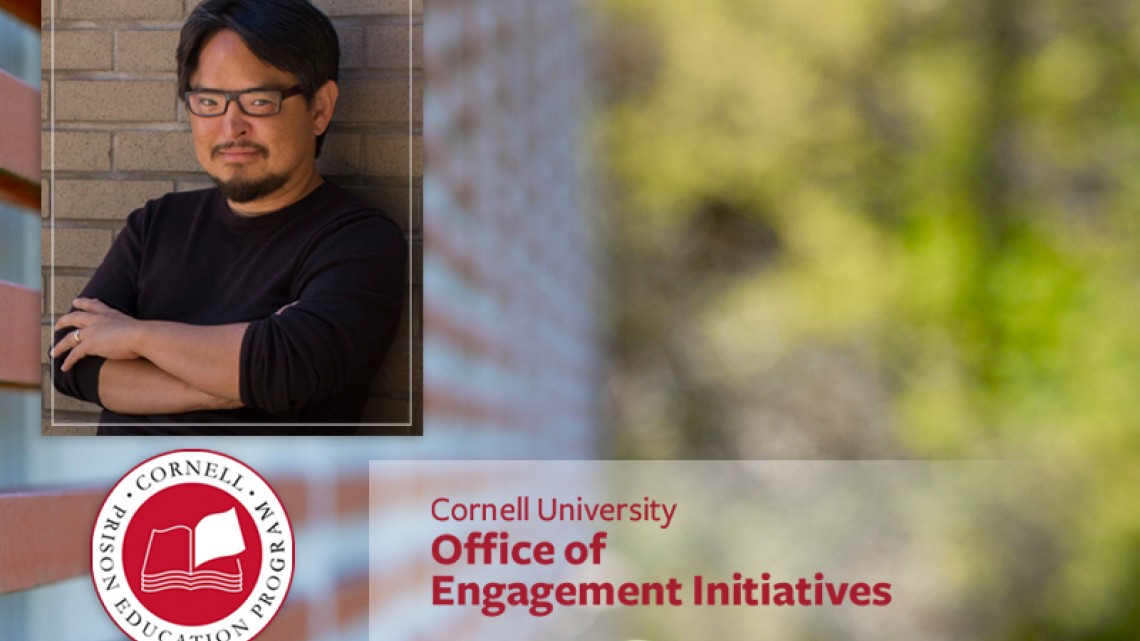
Anthony Ong
News directly from Cornell's colleges and centers
Engaged learning spotlight: beyond incarceration
By Sharon Tregaskis
Positive Psychology and the Prison System
In 2017, developmental psychologist Anthony Ong gave a guest lecture on positive psychology, the study of what makes life worth living. Unlike most such talks the professor of Human Development gives, however, this one required a series of background checks.
Ong had been invited to Auburn Correctional Facility, the maximum-security state prison for men an hour north of Ithaca. On the appointed day, Ong, who also directs Cornell’s Human Health Labs, was escorted through multiple security checkpoints to the venue and, having been forbidden to bring notes of any kind, he gave an extemporaneous talk on how mindset affects human health and longevity. “I was standing in the middle of a chapel, on prison grounds, on a stage behind a pulpit,” Ong recalls. “I give the talk and there’s a half-dozen guys asking questions—hard questions, like Why should we care about positive psychology? Why give us hope in this hopeless environment?”
“The carceral experience poses unique challenges. Prison is made to deconstruct ideas like hope, forgiveness, purpose."
Richard Rivera, Cornell Prison Education Program Alumni Advisory Board
Those questions planted the seeds for Ong’s latest course, the three-credit Positive Psychology: Inside Prison (and Out). A partnership with the Cornell Prison Education Program (CPEP), which brings Cornell courses—and undergraduates—to New York State prisons, HD4390 was funded by an Engaged Cornell curriculum grant. To accommodate ongoing pandemic social distancing requirements and tech constraints within the prison system, Ong embraced a Zoom-based format and homed in on how positive psychology informs the post-incarceration transition. Cornell seniors and CPEP alumni now living across the U.S. were invited to enroll.
In addition to readings and lectures to introduce the basics of the field, Ong assigned Halfway Home: Race, Punishment, and the Afterlife of Incarceration by Reuben Miller, a University of Chicago faculty member who was previously a chaplain at the Cook County Jail. Says Ong: “I didn’t want to create a voyeuristic dynamic among the students in the class where formerly incarcerated people were expected to tell Cornell seniors what it’s like to be in prison or the seniors were expected to teach formerly incarcerated people what it’s like being a student at Cornell.” The book— and subsequent discussions—provided common ground.
Each week, students explored a practice shown to affect personal resilience and well-being. They measured their personal happiness levels, performed random acts of kindness, attended to their sleep hygiene, then submitted short reflection papers on each experience. Working in small groups—which met online to discuss each week’s theme—they also produced capstone projects featuring a proposed study to analyze a positive psychology–informed re-entry intervention designed by the group.
Richard Rivera, a member of the CPEP alumni advisory board, was incarcerated at the age of 16, earning a GED, plus bachelor’s and master’s degrees, prior to his release in 2019. He enrolled in the course because he has deep, philosophical questions about how positive psychology relates to incarceration. “The carceral experience poses unique challenges,” says Rivera. “Prison is made to deconstruct ideas like hope, forgiveness, purpose.”
Even the adversarial judicial system runs counter to fundamental themes of the course, Rivera notes, as a person pleads “not guilty,” then mounts an appeals process that can span decades. “What is contrition—to feel shame, to feel remorse?” he muses. “The very structure and setup of criminal justice is you’re told not to do that. These positive psychology ideas of keeping a journal, asking forgiveness, are really, really relevant today, in real time, to someone incarcerated or coming out of prison.”
Amber Tan ’21, a Human Biology, Health, and Society major, envisions a career in education and has reveled in the diversity of perspectives she’s encountered in HD4390. Since arriving in Ithaca, the Indiana native has been increasingly involved in prison abolition. She questions what positive psychology can offer to formerly incarcerated people who are systematically disenfranchised by policies that affect access to housing, employment, the ballot box. “A lot of classes can get really lofty, but it helps having formerly incarcerated people who have been dropping these real-world insights,” says Tan. “We’re talking about helping people harness resilience, grit, when facing all these restrictions, without having citizen rights.”
Tim Kaye, who earned an associate’s degree through CPEP and is now exploring bachelor’s degree programs, notes that beyond all he’s learned in Ong’s course about how the mind works, he’s been grateful for the opportunity to share a classroom with Cornell students, even if it was uncomfortable at first. “They don’t announce it, but the students know who was previously incarcerated,” says Kaye. “We don’t want to be judged and neither do they. Sometimes you need to be reminded—we’re all people, have the same basic needs in life.”
Media Contact
Get Cornell news delivered right to your inbox.
Subscribe